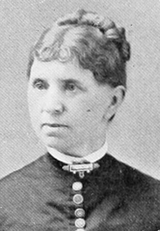Frances Fuller Victor
| Frances Fuller Victor | |
|---|---|
 | |
| Born |
May 23, 1826 Rome, New York |
| Died |
November 14, 1902 (aged 76) Portland, Oregon |
| Occupation | Writer |
| Genre | History |
| Notable works | History of Oregon |
| Spouse | unknown; Henry C. Victor |
|
Literature portal | |
Frances Auretta Fuller (Barritt) Victor (pen names: Florence Fane,[1] Dorothy D.) (May 23, 1826 – November 14, 1902)[1] was an American historian and historical novelist. She has been described as "the first Oregon historian to gain regional and national attention."[2]
Life
Fuller Victor was born in New York and was raised with her sister Metta Victoria Fuller Victor, also a writer, in Ohio and Pennsylvania.[1][3] She was educated in a ladies' seminary in Wooster, Ohio.[4] The sisters both published stories and poems in the Morris & Willis Home Journal, and in 1848 they moved to New York together.[1]
Frances moved to St. Clair, Michigan in 1851 to help care for her mother and younger sisters. She first married in 1853, and she and her husband homesteaded near Omaha, Nebraska Territory. She left her husband, however, returning to live with Metta in New York.[1] She married Henry C. Victor, a naval engineer[5] and brother of Metta's husband, in 1862.[1]
The couple moved to San Francisco the year they were married and then to Oregon in 1864, settling in Portland.[3][5]
Following the move to Oregon, Fuller Victor's writing shifted from fiction and feature articles to book-length regional histories. Over the next 13 years, she compiled first-hand accounts of the history of Oregon from territorial leaders like Joseph Meek, Oliver Applegate, and Matthew Deady.[3] Her diligent studies informed both her fiction and her historical writing, contributing to her success as a writer.[3] Her fiction in this period was considered to accurately capture the spirit of western expansion and the notion of Manifest Destiny.[6] She also continued to write about women's rights, and among the publications she wrote for was Abigail Scott Duniway's The New Northwest.[7]
Henry C. Victor died in the wreck of the steamship Pacific off Cape Flattery on November 4, 1875.[8] In need of money, Fuller Victor moved back to San Francisco to accept a 10-year contract offered by historian Hubert Howe Bancroft. The terms of the contract required her to turn over her extensive collections and research.[5] She contributed major portions of Bancroft's monumental work, The History of the West,[5] though Bancroft published her work under his own name.[9]
After she left Bancroft's company, Fuller Victor returned to Oregon, where she was commissioned by the Oregon Legislative Assembly to write a history of the Anglo-Indian wars, which was titled The Early Indian Wars of Oregon.[3] To cover her living expenses, she also sold face cream and other articles door-to-door.[5]
Fuller Victor was buried at River View Cemetery in Portland.[10]
Works by Frances Fuller Victor
- Anizetta, the Guajira; or, The Creole of Cuba (1848)
- East and West; or, The Beauty of Willard's Mill (1862)
- The Land Claim: A Tale of the Upper Missouri (1862)
- Manifest Destiny in the West (1869), featured in the Overland Monthly and Out West Magazine
- The River of the West: The Adventures of Joe Meek (1870)
- All Over Oregon and Washington (1872)
- social columns for San Francisco's Daily Morning Call, written under the penname Dorothy D (mid-1870s)
- "The Literature of Oregon." The West Shore 1 (1876)
- The New Penelope: And Other Stories and Poems (1877)
- Under contract with Hubert Howe Bancroft:
- History of Oregon (1888)
- History of California: 1846–1848 (1890)
- History of Washington, Idaho, and Montana: 1845–1889 (1890)
- History of Nevada, Colorado, and Wyoming, 1540–1888 (1890)
- History of the Pacific states of North America (1890)
- Atlantis arisen: or, Talks of a tourist about Oregon and Washington (1891)
- The Early Indian Wars of Oregon (1894)
- Autobiographical Sketch (1895)
- Poems (1900)
Further reading
- Martin, Jim (1992). A Bit of A Blue: The Life and Work of Frances Fuller Victor. Salem, Oregon: Deep Well. ISBN 978-0-9632066-0-2.
- Barritt, Mrs. Frances F. from the Beadle and Adams Dime Novel Digitization Project
References
- ↑ 1.0 1.1 1.2 1.3 1.4 1.5 Frances Auretta Fuller Victor. Encyclopædia Britannica. 2009. Encyclopædia Britannica Online. July 10, 2009 .
- ↑ Etulain, Richard (September 4, 2011). "A brief history of Oregon historians". The Oregonian.
- ↑ 3.0 3.1 3.2 3.3 3.4 Frances-Fuller Victor, City of Portland
- ↑ Morris, William A. (1 Dec 1902). "Historian of the Northwest. A Woman Who Loved Oregon: Frances Fuller Victor". The Quarterly of the Oregon Historical Society 3. Retrieved 14 April 2013.
- ↑ 5.0 5.1 5.2 5.3 5.4 Curtis, Walt (1995). "Frances Fuller Victor (1826-1902)". Oregon Cultural Heritage Commission.
- ↑ Sheri Bartlett Browne. "Frances Fuller Victor". The Oregon Encyclopedia.
- ↑ "19th Century Women Writers in Corvallis, Oregon". Corvalliscommunitypages.com. Retrieved 2011-09-03.
- ↑ "The Steamship Pacific," The Oregonian, November 9, 1875, page 3
- ↑ Johnson Bube, June (1997). "Prefiguring the new woman: Frances Fuller Victor's refashioning of women and marriage in "The New Penelope"". Frontiers.
- ↑ River View Cemetery. Find A Grave. Retrieved on March 12, 2008.
External links
| Wikimedia Commons has media related to Frances Fuller Victor. |
- Works by Frances Fuller Victor at Project Gutenberg
- Works by or about Frances Fuller Victor at Internet Archive
|